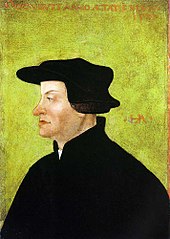Commentarius de vera et falsa religione

Commentarius de vera et falsa religione ( German commentary on true and false religion ) is the title of the best-known written work by the Zurich reformer Huldrych Zwingli . In it he deals in detail with the central points of his theology in contrast to the Catholic tradition .
Emergence
Zwingli wrote the work in 1525 as an evangelical creed after consolidating his political and theological teachings in Zurich through several disputations . The work is dedicated to the French King Franz I , whom the reformers wanted to persuade to convert . Zwingli, however, addresses the script to the scholarly public throughout Europe. His work serves to profile his theology in contrast to Catholicism, the Anabaptist movement and the theology of Martin Luther .
content
Zwingli goes into 29 sections on the essential characteristics of the Reformed faith. The focus is on controversial areas such as the sacraments , the Lord's Supper , marriage , images and statues as well as political issues such as the authorities. In addition, Zwingli does not shy away from addressing the fundamental questions about the essence of God , man or religion as such. Although Zwingli marked the script as a “sketch”, its clear structure and reliable argumentation style made it a fundamental work of the Zwinglian Reformation. Zwingli's argument is characterized by an examination of the Catholic tradition and the arguments of his opponents, such as Johannes Eck . In the spirit of Protestant theology, Zwingli cites passages from the Bible as the most weighty arguments, whereby the educated humanist also refers to ancient and other writings and in places also expresses a certain pragmatism .
In the preface to the writing Zwingli threw Pope Alexander VI. suggested that he had allowed himself to be called "God". The background to his allegation was that at Alexander's coronation, “Rome made a great Caesar. Now Alexander boldly lifts it up to the summit, man, that one God! ”Was to be read. Zwingli noted in the preface: "We cannot deny it: 'God on earth' we have called him".
Meaning and reception
The commentary is considered to be the first writing of the Swiss Reformation to be a comprehensive and argumentative creed. The historical significance can be seen, on the one hand, in the fact that Zwingli's position in comparison to Catholicism and Luther was clearly presented in the international theological debate for the first time. On the other hand, the work was an important basis for the important reformers Jean Calvin and Heinrich Bullinger , who succeeded Zwingli with the Confessiones Helveticis , creating the spiritual foundation for a reformed church throughout Switzerland .
expenditure
- De vera et falsa religione. Huldrychi Zvinglij commentarius . Zurich 1525, doi : 10.3931 / e-rara-3019
- From warm and valschem glouben. Commentarius, dz is Huldrych Zvinglin's teaching. Distributed by Leonem Jud . Zurich 1526, doi : 10.3931 / e-rara-1734
literature
- Huldrych Zwingli: Schriften III , Theologischer Verlag Zürich TVZ, Zürich 1995.
- Sigmund Widmer: Zwingli , Theologischer Verlag Zürich TVZ, Zürich 1984.
Individual evidence
- ↑ Vera et falsa religione , pp. 3f; quoted from: Fritz Blanke: Hauptschriften by Ulrich Zwingli , vol. 9, part 1: Huldrych Zwingli's commentary on true and false religion, translated and explained by Fritz Blanke , 1941, p. 4; see also: Klabund: Borgia